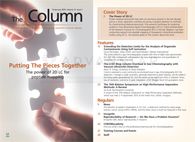Eastern Analytical Symposium Summary
Summary of the Eastern Analytical Symposium 2015.
The 54th Eastern Analytical Symposium and Exhibition was once again held at Garden State Exhibition Centre in Somerset, New Jersey, USA, and proved to be another exceptional meeting of analytical chemists. There was a wide and varied programme of presentations, short courses, and posters on offer with a notable plenary lecture by Nobel Laureate Professor Kurt Wüthrich. The 2015 EAS President Oscar Liu described the Nobel Laureates talk as “inspiring” and was pleased with the “enthusiasm and energy of participants [who] kept the level of engagement high”. However, the EAS does not just exist to provide a venue for cross-disciplinary knowledge sharing, career development, and networking, but also to recognize those individuals who have advanced their respective fields in an exceptional manner. The following individuals were all deemed to have enhanced their fields of study with remarkable work:
2015 American Microchemical Society Benedetti Pichler Award - Apryll Stalcup, Dublin City University, Ireland.
2015 EAS Award for Outstanding Achievements in Mass Spectrometry - Emile A. Schweikert, Texas A&M University, USA.
Outstanding Achievements in the Fields of Analytical Chemistry Award - Professor Chris Enke, Michigan State University, USA.
Outstanding Achievements in Separation Science Award - Professor David S. Hage, University of Nebraska, USA.

HPLC 2025 Preview: Fundamentally Speaking (Part 1)
May 13th 2025Michael Lämmerhofer from the Institute of Pharmaceutical Sciences, University of Tübingen, Germany, spoke to JFK Huber Lecture Award winner of 2024 Torgny Fornstedt, professor in analytical chemistry and leader of the Fundamental Separation Science Group, Karlstad University, Sweden, about his pioneering work in high performance liquid chromatography (HPLC) with a focus on fundamentals and industrial applications.
Determining Ways to Protect Honeybee Colonies with GC–MS
May 13th 2025A study conducted by the Agriculture Research Centre of Giza, Egypt, and Jilin Agricultural University in China, evaluated the efficacy of stinging nettle extract, nettle smoke, and formic acid in the controlling of Varroa mites, a major threat to honeybee colonies, with a focus on mite infestation reduction, honeybee mortality, and biochemical responses. Gas chromatography–mass spectrometry (GC–MS) was used to identify key bioactive compounds in the stinging nettle extract.

.png&w=3840&q=75)

.png&w=3840&q=75)



.png&w=3840&q=75)



.png&w=3840&q=75)











